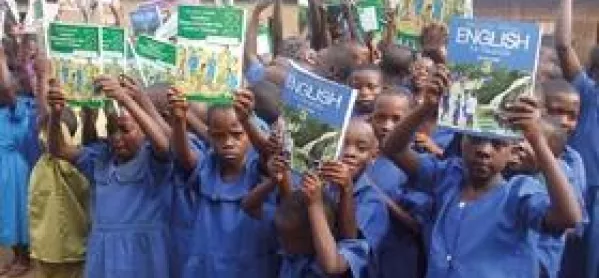Out of Aberdeen and into Africa

It’s almost 20 years since the genocide in Rwanda, but the lingering after-effects made for a challenging school trip for 10 students from Aberdeen.
Students at Harlaw Academy have been involved in the schooling of children in the African country since their citizenship group decided to sponsor five students in 2010 - one for each school house. Those students are now halfway through their second year at secondary school and will be sponsored for six years at school.
Each of the five Harlaw school houses raises pound;10 a month to pay for one student’s education and another pound;20 a year for their mattress and basics such as pencils and notebooks. The money comes from collections of small change at school assemblies and occasional fundraising.
For the past three years, the students have exchanged photographs and letters. But in May, 10 of the Scottish children had the chance to experience the reality of African life when they took a 16-day, 10,000- mile round trip with their teachers to Rwanda.
The group was led by depute head Aileen Hunter and colleague Helen Taylor, and included three trustees from the Rwandan School Village Project known as RSVP, which runs the sponsorship programme. “It was an exciting and an adventurous choice,” Mrs Hunter says.
Students learned lessons that you don’t get in a classroom and were sometimes moved to tears seeing the poverty and malnutrition of the African children. It has led these young people to reconsider their values and aspirations after meeting people who are happy with few material possessions, she says.
The school’s connection with RSVP came through a relative of one of the depute heads who is a trustee of the charity. Among the trustees who travelled with the group was Dr Simon Mbarushimana, a doctor working in the UK, who was himself once a sponsored child.
“Just like children sponsored through RSVP, I was born in total poverty,” he says. “I wore shoes, owned a toothbrush and used soap, socks and underpants for the first time at 15.
“This was all due to church friends and a Swiss missionary, as my family was poor. Sponsorship not only helped me to fly with my own wings, but it proved a low-cost but very effective way of getting one more child out of poverty.”
About 800,000 people were massacred in just 100 days in the Rwandan genocide of 1994. Today, the country described as “the land of a thousand hills” is anxious to promote itself as a safe destination and encourages tourists to come and enjoy the wildlife.
The school group stayed in a nunnery and visited Mihabura Primary School, which is supported by RSVP. They joined in with classes, took part in cultural exchange evenings and visited the secondary schools where the sponsored African children are boarding.
At one point, they visited local markets and bought five goats, which they presented to the families of each of the sponsored children. They also helped to build a local church and visited a regional hospital, where they learned about the devastating effects of HIV and Aids in Africa.
Students found the trip fascinating but occasionally upsetting. “The most challenging time was feeding the babies with malnutrition at the hospital - but at the same time it felt good because you were doing good helping them,” says 15-year-old Matthew Gray.
But witnessing how their peers live was also shocking. “Seeing my house’s sponsored pupil, Jean-Pierre, was the highlight for me,” explains Mitchell Sinclair, 14. “Their home was just so small - people shouldn’t have to live like that. Their living room wasn’t even the size of a hallway. It was very emotional.”
The students also visited the Kigali Genocide Memorial Centre, where alongside the names of the young people who died was listed their favourite toy, alongside details of their family and how they had perished.
But there was a more exuberant mood when the visitors joined a church congregation for worship. “I enjoyed the church. I liked seeing how passionate the people over there were and how religious they were,” says Robert Wilson, who doesn’t usually attend church at home. “It was louder than the football ground here at Pittodrie, which holds 20,000 - it was louder than that with 2,000 people,” he says.
Aileen Hunter says the experience had changed the students’ lives. Some are considering new career paths, while others have expressed a determination to be more committed to their learning after realising their own good fortune.
“It was the best experience of my life,” says Catriona Young, 15. “I want to be a doctor now - not necessarily in Rwanda, but in a developing country.”
Holly Haigh, also 15, says that seeing what Rwandan children achieve has made her even more determined to work hard to get into veterinary school. “Their work ethic is so amazing,” she says.
The journey was supported by funding from the Wood Family Trust and Aberdeen Endowments Trust while Aberdeen FC donated football strips as gifts for the Rwandan children. Local accountancy firm Atholl Scott donated football boots.
“The most exciting thing was when they opened the bag with the football boots,” teacher Helen Taylor says. “The children play football in bare feet and this was allowing them to play against other schools wearing football boots.”
Students kept personal diaries and contributed to a blog during their journey. Their commitment to sponsorship has also been strengthened by the experience. Lewis Liversedge, 14, says: “Going there makes you even more determined to raise the money and do as much as you can to help the kids in Rwanda.”
For more details on RSVP, visit: www.rsvpcharity.org.uk To read the students’ blog, visit harlawrwanda2013.wordpress.com. Photo credit: Alamy
Keep reading for just £1 per month
You've reached your limit of free articles this month. Subscribe for £1 per month for three months and get:
- Unlimited access to all Tes magazine content
- Exclusive subscriber-only stories
- Award-winning email newsletters
